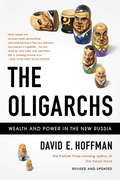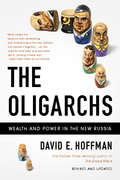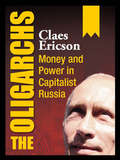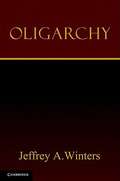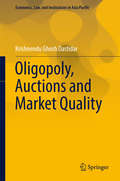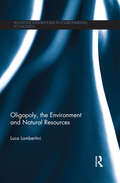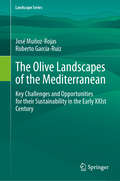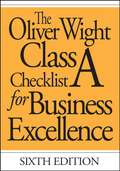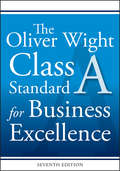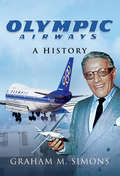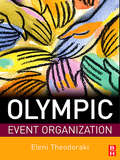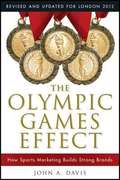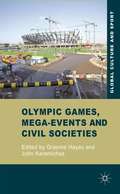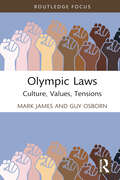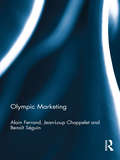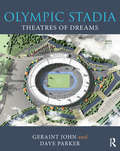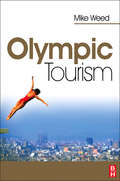- Table View
- List View
The Oligarchs: Wealth And Power In The New Russia
by David HoffmanIn this saga of brilliant triumphs and magnificent failures, David E. Hoffman, the former Moscow bureau chief for the Washington Post, sheds light on the hidden lives of Russia’s most feared power brokers: the oligarchs. Focusing on six of these ruthless men- Alexander Smolensky, Yuri Luzhkov, Anatoly Chubais, Mikhail Khodorkovsky, Boris Berezovsky, and Vladimir Gusinsky-Hoffman shows how a rapacious, unruly capitalism was born out of the ashes of Soviet communism.
The Oligarchs: Wealth and Power in the New Russia
by David E. HoffmanDavid Hoffman, former Moscow bureau chief for The Washington Post, sheds light onto the hidden lives of Russia's most feared power brokers: the oligarchs. Focusing on six of these ruthless men Hoffman reveals how a few players managed to take over Russia's cash-strapped economy and then divvy it up in loans-for-shares deals. Before perestroika, these men were normal Soviet citizens, stuck in a dead-end system, claustrophobic apartments, and long bread lines. But as Communism loosened, they found gaps in the economy and reaped huge fortunes by getting their hands on fast money. They were entrepreneurs. As the government weakened and their businesses flourished, they grew greedier. Now the stakes were higher. The state was auctioning off its own assets to the highest bidder. The tycoons go on wild borrowing sprees, taking billions of dollars from gullible western lenders. Meanwhile, Russia is building up a debt bomb. When the ruble finally collapses and Russia defaults, the tycoons try to save themselves by hiding their assets and running for cover. They turn against each other as each one faces a stark choice--annihilate or be annihilated. The story of the old Russia was spies, dissidents, and missiles. This is the new Russia, where civil society and the rule of law have little or no meaning.
The Oligarchs: Wealth and Power in the New Russia
by David E. HoffmanDavid Hoffman, former Moscow bureau chief forThe Washington Post,sheds light onto the hidden lives of Russia's most feared power brokers: the oligarchs. Focusing on six of these ruthless men Hoffman reveals how a few players managed to take over Russia's cash-strapped economy and then divvy it up in loans-for-shares deals. Before perestroika, these men were normal Soviet citizens, stuck in a dead-end system, claustrophobic apartments, and long bread lines. But as Communism loosened, they found gaps in the economy and reaped huge fortunes by getting their hands on fast money. They were entrepreneurs. As the government weakened and their businesses flourished, they grew greedier. Now the stakes were higher. The state was auctioning off its own assets to the highest bidder. The tycoons go on wild borrowing sprees, taking billions of dollars from gullible western lenders. Meanwhile, Russia is building up a debt bomb. When the ruble finally collapses and Russia defaults, the tycoons try to save themselves by hiding their assets and running for cover. They turn against each other as each one faces a stark choice--annihilate or be annihilated. The story of the old Russia was spies, dissidents, and missiles. This is the new Russia, where civil society and the rule of law have little or no meaning.
The Oligarchs
by David E. HoffmanIn this saga of brilliant triumphs and magnificent failures, David E. Hoffman, the former Moscow bureau chief for the Washington Post, sheds light on the hidden lives of Russia's most feared power brokers: the oligarchs. Focusing on six of these ruthless men- Alexander Smolensky, Yuri Luzhkov, Anatoly Chubais, Mikhail Khodorkovsky, Boris Berezovsky, and Vladimir Gusinsky-Hoffman shows how a rapacious, unruly capitalism was born out of the ashes of Soviet communism.
The Oligarchs
by Hugh Rodwell Claes EricsonThe Oligarchs is the dramatic but serious story about how a small group of young entrepreneurs could become some of the world's richest men and get control of the president of a fallen super-power in the process.
Oligarchy
by Jeffrey A. WintersFor centuries, oligarchs were viewed as empowered by wealth, an idea muddled by elite theory early in the twentieth century. The common thread for oligarchs across history is that wealth defines them, empowers them and inherently exposes them to threats. The existential motive of all oligarchs is wealth defense. How they respond varies with the threats they confront, including how directly involved they are in supplying the coercion underlying all property claims and whether they act separately or collectively. These variations yield four types of oligarchy: warring, ruling, sultanistic and civil. Moreover, the rule of law problem in many societies is a matter of taming oligarchs. Cases studied in this book include the United States, ancient Athens and Rome, Indonesia, the Philippines, Singapore, medieval Venice and Siena, mafia commissions in the United States and Italy, feuding Appalachian families and early chiefs cum oligarchs dating from 2300 BCE.
Oligopoly, Auctions and Market Quality
by Krishnendu Ghosh DastidarTheories of oligopoly and auctions have a direct link with the theory of market quality. Surprisingly, however, this link has not been adequately analysed in the literature. This book fills that gap and focusses on the interconnections between theories of oligopoly, auctions, and market quality. It brings together the relevant theoretical results in the literature on these topics under a unified framework and argues that insights from the theories of oligopoly and auctions can help us understand and analyse problems related to market quality. While the book is mainly theoretical in nature, it also discusses some specific issues related to the problems of market quality in emerging economies like that of India. The book also shows how in such specific cases, insights from the theoretical results on oligopoly and auctions can be used to improve market quality. Illustrated by carefully chosen examples and supported by case studies, this book is highly recommended to readers who seek an in-depth and up-to-date integrated overview of the new field of market quality economics
Oligopoly, the Environment and Natural Resources (Routledge Explorations in Environmental Economics)
by Luca LambertiniIndustrial production and consumption patterns rely heavily on the intensive use of both renewable and non-renewable resources and the consequences for the environment can be serious. Following a long period of time where the profit incentives of firms have prevailed over preservation of the environment and the world’s natural resources, a new consensus has emerged concerning the need to regulate firm behaviour, aimed at ensuring the sustainability of the economic system in the long run. This book offers an exhaustive overview of current economic debate about these topics, taking modern oligopoly theory as a benchmark. The first part of the book covers static models dealing with incentives for green research and development, Pigovian taxation, cartels, environmental quality and international trade, as well as the role of corporate social responsibility, public firms and consumer environmental awareness as endogenous regulatory instruments. Then, the author moves on to examine the role of time while drawing from optimal control and differential game theory. This opens the way to the discussion of fair discount rates to ensure the welfare of future generations, as well as the long run sustainability of production and consumption patterns.
The Olive Farm Series: The Olive Farm, The Olive Season, and The Olive Harvest (The Olive Farm Series)
by Carol DrinkwaterThe acclaimed actress and author recounts her new life on a French olive farm, in this collection of three &“good-humored and well-written&” memoirs (The Washington Post).The Olive Farm After falling in love with Provence, actress Carol Drinkwater and her film-producer fiancé, Michel, decide to purchase an abandoned farm near Cannes. Inspired but inexperienced, they begin fixing up the ten-acre property as they meet quirky locals, puzzle through France&’s legal bureaucracy, and explore nearby Mediterranean islands.The Olive Season As newlyweds Carol and Michel settle into marriage, they experience the glamor of southern France with its aristocratic dinner parties and the world-renowned Cannes film festival—as well as the dirt-caked, sunbaked life of farmers. Carol also shares her hopes and fears as she anticipates motherhood in this alternately entertaining and emotionally poignant memoir.The Olive Harvest When Carol and Michel return to Provence, they face a season of great difficulty. The farm is suffering from drought, and wild boars have been destroying the fences. But there are bigger problems to come when an accident in Monte Carlo leaves Michel barely functional. As he recuperates, Carol must face challenges of all kinds—and hope that in the end, nature will provide.
The Olive Landscapes of the Mediterranean: Key Challenges and Opportunities for their Sustainability in the Early XXIst Century (Landscape Series #36)
by José Muñoz-Rojas Roberto García-RuizThis book provides a state-of-the-art review of the current models and typologies of olive landscapes and related farming systems in the Mediterranean. It also explores potential prospects for monitoring and enhancing their sustainability standards. Olive groves are an essential component of the historical landscape that largely drive the cultural, ecological and socio-economic character of the region. Agronomic intensification and mechanization, market globalization and delocalization, and financialization are affecting these ancient farming systems in certain olive landscapes, whereas others are threatened by abandonment and financial loss. This complex set of processes is resulting in a heterogeneous mosaic of olive landscapes when examined across nested spatial-temporal scales and institutional levels. In alignment with such complexity, multiple challenges are arising linked to sustainability standards and targets. Sustainability has actually been the subject of much public discussion and yet of not nearly enough scientific evidence-gathering that is both robust and comparable across geographic contexts and scales. This is where this book is expected to provide a meaningful contribution. Ultimately, the main objective of this book is to establish a base-line sustainability picture of the complex mosaic of olive landscapes across the Mediterranean region. The book is structured along a series of national /regional and thematic reviews and syntheses, which lead to joined-up reflections on current and future challenges, opportunities and trajectories for enhancing the sustainability of olive landscapes across the Mediterranean. The book will be of interest to academics and researchers, policy-makers, the farming community, and market agents alike. We expect that they will find in this book an overall picture of the sector´s current situation and plausible pathways for achieving enhanced sustainability standards, whilst also permitting the reader to gain depth on the contingent characteristics of the different drivers, components and typologies of these dynamic and valuable landscapes.
The Oliver Wight Class A Checklist for Business Excellence
by NullThe Oliver Wight Class A Checklist for Business Excellence The leading business improvement specialists who educate, coach and mentor people to lead and sustain change on the journey to business excellence and outstanding business performance * Managing the Strategic Planning Process * Managing and Leading People * Driving Business Improvement * Integrated Business Management * Managing Products and Services * Managing Demand * Managing the Supply Chain * Managing Internal Supply * Managing External Sourcing
The Oliver Wight Class A Standard for Business Excellence
by Inc. Oliver Wight InternationalThe Oliver Wight Class A Standard for Business Excellence is the definitive, comprehensive statement of excellence in business today. Oliver Wight’s Class A Standard is the accumulated practice and experience of Oliver Wight Consultants around the world. It reflects the effort and achievement of thousands of client companies who have used the standard, and the benchmark capability it enables, to differentiate their business. The Seventh Edition will be the standard of business excellence for all businesses. The standard will take the reader through an understanding of business maturity and how to drive increase maturity with corresponding sustainable business benefit. Using the Oliver Wight Proven Path, a journey of “Milestones” focused on strategic priorities that drive you through a series of defined Maturity Transitions, people, behavior and processes all become more aligned and focused. Updated content will include new information on collaboration, segmentation, value chain, analytics, optimization, and planning. Please note: Previous editions of this book were titled The Oliver Wight Class A Checklist for Business Excellence.
Olivia Lum: Wanting to Save the World
by Geoffrey G. Jones Essie AlamsyahThis case considers the entrepreneurial career of Olivia Lum, who founded the Singaporean water company Hyflux in 1989. An orphan born in Malaysia, Lum provides a rare case of an entrepreneurial success in a country whose economic success has primarily rested on state-owned and foreign firms. The case describes the formidable challenges she initially faced, her subsequent breakthrough in China, and the subsequent growth as a global water treatment company employing membrane technology. In 2004 the company entered the large Middle Eastern market for water treatment but soon encountered problems, including political turbulence. The case ends with demonstrations and an emergent crisis in Libya in 2011, a country in which Hyflux had recently invested. The case offers opportunities to explore the nature of entrepreneurship in Southeast Asia, the business importance of relationships between overseas Chinese and mainland China, and the challenges faced by female entrepreneurs. More broadly, it serves as vehicle for teaching students about the global water crisis and the role of business in helping to resolve it.
Olympic Airways: A History
by Graham M. Simons&“Readers with an interest in the early days of organized civil mass air transport will enjoy having a familiar story be retold from a Greek perspective.&” —SpeedReaders The Olympic Airways story has fascinated Graham M. Simons for many years. This new book represents the culmination of decades spent researching the history of this fascinating Greek airline. It is a story of evolution, conflict, personality and politics, all set against a backdrop of world and civil wars, coups and countercoups. During the course of his research, it became apparent to the author that many of the fine details pertaining to the company weren&’t widely known, although almost everyone had heard of the towering, controversial, leading figurehead who oversaw much of the central part of the story: Aristotle Socrates Onassis. His colorful life is threaded through this history, lending it drama and multiple levels of intrigue. The airline&’s story cannot be told in isolation. Olympic did not spring fully formed into being in 1957. The named company may have come into being then, but its roots were set much further back in history through a number of predecessor airlines—both national and international—who had been using the Hellenic Republic and Athína as the crossroads of the air for the Eastern Mediterranean since the dawn of aviation. This is the story of the birth and dramatic life of an airline with a checkered, controversial and complicated history. Graham M. Simons has skillfully woven all the various threads to create a powerful and important historic record.
Olympic Event Organization
by Eleni TheodorakiOlympic Event Organization is the first text to address a number of important questions in contemporary mega-event management: Which organizations are involved in the Olympic Movement and in what capacity? What are the interorganizational flows of authority and finance between them? How is work grouped, in what unit sizes, how specialized and formalized are work processes? How complex, dynamic, diversified, or friendly is their environment? What are the power issues and how do the technological processes affect these organizations? How do the OCOGs evolve in their life cycle, what pressures shape their structures and management processes and how is work co-ordinated? The examination of the Olympic Games event organization in the 10-year period, from bidding to post-games closing down, draws material from host cities to explore the types of interorganizational flows that take place at various stages for the Olympic Games to be delivered. Knowledge transfer from one host city to the next and an established organizational field also means that management practises sometimes follow some externally imposed organizing logics. The challenges faced by organizers are discussed and the tensions that a strong management template from the IOC creates are also examined. Finally, the issue of sustainability of the Olympic Games is identified along with an analysis of the ways in which the concepts of impact are appropriated by the various stakeholders involved with the Olympic Games as they attempt to influence public opinion.Written in an accessible and insightful manner Olympic Event Organization is essential reading for both academics and practitioners alike.
The Olympic Games Effect
by John A. DavisMarketing at the Olympics, the attraction and the rewards Essential reading in preparation for the 2012 London Olympics, the newly revised and fully updated second edition of The Olympic Games Effect offers fascinating sports marketing and branding insights into the promotion of the Games themselves, and their unique attraction for corporations in particular. The important lessons of past Olympics will be used to show a hundred year-plus tradition based on a several thousand year old testament to the love of sports and competition, revealing how, in recent years, this has evolved into a seductively attractive vehicle for a wide range of audiences, from consumers to corporations. Loaded with historical information on the Olympics, the book traces the history of the Olympics back to 776 BC. This legacy is vital to the ongoing success of the Olympics, and is at the heart of why brands care so much Packed with illustrations that illustrate how the Games have become arguably the world's most successful sports event and the marketing opportunities this has led to Includes relevant business strategies and recommendations to help companies understand how to make more effective sports sponsorship decisions This timely new edition of The Olympic Games Effect shows the value contributed by sponsoring the world's premier sporting event, and explains how, by extension, other global sports events have the potential to generate similarly impressive results for their sponsors.
Olympic Games, Mega-Events and Civil Societies
by Graeme Hayes John KaramichasThis volume explores sporting mega-events, their social, political, and cultural characters, the value systems that they inscribe and draw on, the claims they make on us and the claims the organisers make for them, the spatial and ethical relationships they create, and the responses of civil societies to them.
Olympic Laws: Culture, Values, Tensions (Routledge Focus on Sport, Culture and Society)
by Mark James Guy OsbornOlympic Laws: Culture, Values, Tensions is the first book to analyse fully the Olympic legal framework and its application to the IOC and the Olympic Games through a socio-legal lens. It opens up a new window into understanding the Olympic Games across recent iterations of the Games and on to future Games. The book begins by defining the parameters of the emergent legal sub-fields of Sports Law, lex Olympica and Olympic Law, through the identification of the sources of these Olympic Laws and their underpinning norms. It then uses a series of case studies to demonstrate how lex Olympica has evolved as a means of defending the Olympic Movement from unwanted legal interventions, how Olympic Law has been created to protect the commercial rights vested in the Games, and how the legacies created by this unique category of law have a lasting impact on host cities and beyond. It concludes with a call that the IOC should recalibrate its relationships with prospective hosts and the participating athletes by requiring specific adherence to the Fundamental Principles of Olympism. This is essential reading for any student or researcher with an interest in Olympic studies, sports law, or socio-legal studies or any practising lawyer or events professional looking to better understand the impact and institutions of mega-events.
Olympic Marketing
by Alain Ferrand Jean-Loup Chappelet Benoit SeguinThe Olympic Games have become the definitive sports event, with an unparalleled global reach and a remarkably diverse constituency of stakeholders, from the IOC and International Federations to athletes, sponsors and fans. It has been estimated, for example, that 3.6 billion people (about half of the world population) watched at least one minute of the Beijing Games in 2008 on television. The driving force behind the rise of the modern Olympics has been the Olympic marketing programme, which has acted as a catalyst for cooperation between stakeholders and driven the promotion, financial security and stability of the Olympic movement. This book is the first to explain the principles of Olympic marketing and to demonstrate how they can be applied successfully in all other areas of sports marketing and management. The book outlines a strategic and operational framework based on three types of co-productive relationships (market, network and informal) and explains how this framework can guide professional marketing practice. Containing case studies, summaries, insight boxes and examples of best practice in every chapter, this book is important reading for all students and practitioners working in sports marketing, sports management or Olympic studies.
Olympic Rent-A-Car U.S.: Customer Loyalty Battles
by John Deighton James KindleyThe marketing and operations managers for Olympic Rent-A-Car meet to decide how to respond to changes in the loyalty rewards program at the market-leading competitor. The competitor's program gives awards based on dollars spent instead of days rented and eliminates blackout dates. Olympic expects the program to capture more of the valuable business traveler segment, which rents cars more frequently and generally pays higher premiums than the leisure traveler segment. At the meeting, the team reviews the financial performance of the firm and the firm's reward program, called Olympic Medalist. They consider whether they can afford to match the competitor's loyalty program terms as they have done in the past and also consider how the competitor's actions will affect the entire car rental industry. Ultimately, they must respond with a truly distinctive strategy. Students must perform a quantitative analysis of each possible response and consider the value of customers in loyalty programs.
Olympic Risks
by Will JenningsThe task of governing the Olympic Games and the Olympic movement now takes place in an age in which states and societies are increasingly organized in response to risk. At the heart of the risk management in organising the Olympics is the tension between the inherent riskiness of mega-events, which is attributable to their scale and complexities, combined with immense societal, political and organisational pressures for the management of risk. Over time, too, staging the Olympics has become more complex, and riskier, as a consequence of its growing scale and commercial success. Since the 1980s, a profound transformation has occurred in how the Games are organised and governed, with the increased transfer of risk to the market and the spread of regulation as a mode of governance and the formal practice of risk management across functions ranging from finance to security to critical infrastructures to public health. This book is a unique theoretical and empirical analysis of how the Olympic Games are governed, exploring the challenges and pressures of staging the world's largest event and the recent emergence of the formal practice of risk management as a response of decision-makers to the operational demands and complexities of the Games.
Olympic Stadia: Theatres of Dreams
by Geraint John Dave ParkerOlympic Stadia provides a comprehensive account of the development of stadia including but not limited to: developments in running tracks, the introduction of lighting, improvements in spectator viewing standards and the introduction of roofs. Written by a world-renowned expert on sports architecture, the book: Systematically analyses every stadium from Athens 1896 to Tokyo 2020 Provides drawings, plans, elevations, photographs and illustrations in full colour Considers the fundamental changes wrought by the incorporation of the Paralympic Games Looks at the impact on host cities and their urban infrastructure, and considers the long-term legacies and massive investments that Olympic stadia require Explores the effects of the demands of the world’s TV broadcasters. An invaluable and beautiful resource for practical insight and inspiration, this book makes essential reading for anyone interested in Olympic stadia.
Olympic Tourism
by Mike WeedOlympic Tourism is the first text to focus on the nature of Olympic tourism and the potential for the Olympic Games to generate tourism in the run up to and long after the hosting of a Games. The awarding of the 2012 Olympics to London will see an increasing interest in the phenomena of organising, managing and analysing the issues which surround mega-event sport tourism. This text will address these issues and using detailed case analysis of previous and future games, discuss how to maximise the success of managing tourism at these events. Written from an international perspective this text provides the reader with: An exploration of the relationship between sport, tourism and the Olympic Games A guide on how to establish Olympic tourism as a phenomenon that goes far beyond the visits of spectators, athletes, officials and dignitaries during the Games themselves. An examination of the detail of Olympic tourism flows before, during and after the Games Analysis of the requisite partnerships between a range of sport, tourism, Olympic and other agencies to successfully leverage and deliver maximum tourism benefits The tools to draw lessons from case studies of previous and forthcoming winter and summer Olympic Games in the 21st Century A discussion of the potential tourism legacies of the Olympic Games Olympic Tourism is a timely response to this international interest and will be an essential resource for those studying and teaching on sport, tourism and the Olympics.
